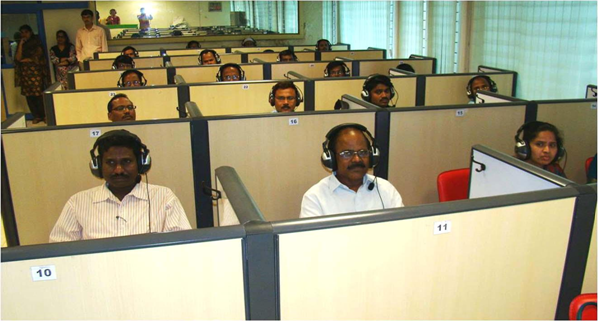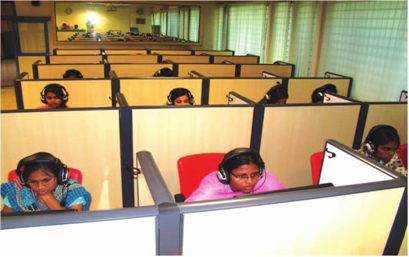 |
Facilitates the students to develop Language (LSRW) skills and personality development. |
 |
Reinforces the Learner capabilities by exposing the students to the latest trends in Communication Skills. |
 |
Equips the students to face the competitive tests Confidently like GRE, TOEFL, MAT, CAT etc., and helping the students to face the interviews without inhibitions. |
 |
The Department has been conducting Orientation and Refresher Courses successfully for the teachers of English, working in JNTUH Affiliated Engineering Colleges on:
 English Language Teaching. English Language Teaching.
 Soft Skills . Soft Skills .
 Managerial Behavior. Managerial Behavior. |
|

Orientation Program Conducted in ELCS Lab by the Faculty of English in March 2011
|
| |
|
ENGLISH LANGUAGE LABORATORIES-BACK GROUND
|
|
English is a subject taught in the first year of Four Year Engineering course. The students are earlier exposed to traditional Intermediate/+2 level syllabus in English, which consists of selected prose lessons, poems, grammar and composition. Fifty percent of EAMCET qualified students are from rural background and vernacular medium and these students’ general proficiency in English is average. They need to mprove their language skills (LSRW), study skills and communication skills in order to justify their roles as professionals in this competitive world.
|
Keeping the necessity and importance of developing language skills of Engineering students in mind, the syllabus of English for first year & third year Engineering students has been modified and restored as per the requirements of the present situation. In this new approach, all the four skills involved in learning a language viz., Listening, Speaking, Reading and Writing are developed through various tasks in theory and lab sessions. By working through the activities, students both fluent and less fluent will be able to improve their effectiveness in using English in reallife situations especially in their chosen profession.
|
|
ROLE OF ENGLISH LANGUAGE LABORATORIES
|
|
The use of language laboratories in teaching English is relatively new concept in our country. Language Lab, a contribution of technology to language teaching, has rendered teaching of English language more successful, more rapid and more interesting. In the present age of nformation Technology, language forms the basic aspect in Science & Technology. Science can be learnt as a subject whereas the art of communication has to be practiced as a skill. Even Gold Medalists miss some of the best chances due to lack of good communication skills and hence knowledge and communication form the two sides of the career.
In order to learn skills, adequate exposure of the language and practice is very much needed. This is possible only in the language laboratories which assure a sense of privacy to the learner and function as self access study center. In addition to this, authentic learning materials are carefully designed and distributed to students for individual, pair and group activities. Skill-oriented activities are performed in the labs to develop language and communication skills of the students.
|
|
ENGLISH LABS PROFILE
|
|
Globalization has brought in numerous opportunities for the teeming millions, with more focus on the students’ overall capability apart from the academic competence. Many students, particularly those from vernacular medium, find that they are not preferred for the jobs due to their inadequacy of communication skills and soft skills despite possessing sound subject knowledge and technical expertise. Keeping in their pre-employment needs and career requirements in view, the Department of Humanities and Social Sciences established the State-of- the-art Multimedia English Language Labs.
The Computer Assisted Language Learning (CALL) lab has the capacity of 60 workstations apart from two Instructor workstations. The software used in language Lab aims to familiarize the learners to the nuances of English speech sounds, word accent, sentence accent, rhythm and intonation, to neutralize the influence of the regional accent and to bring about a consistent accent and intelligibility in their spoken English.
|
|

COMPUTER ASSISTED LANGUAGE LEARNING (CALL) LAB
|
|
Aims of CALL Lab are :
|
 |
To facilitate individualized and independent language learning on the computer using various soft materials |
 |
To sensitize the learners to the nuances of English speech sounds, word accent, sentence accent, rhythm, intonation etc, under the best conditions with carefully selected and graded authentic materials. |
 |
To help students neutralize the influence of the regional accents. |
 |
To bring about a consistent accent and intelligibility in their English by providing an opportunity for practice in extensive and intensive listening and speaking. |
| |
|
| |
Some of the Important Software Used in CALL Lab:
|
 |
Cambridge Advanced Learner's English Dictionary with CD |
 |
Clarity Pronunciation Power – Part I, Part II |
 |
Dorling Kindersley series of Grammar, Punctuation, Composition etc. |
 |
Oxford Advanced Learner’s Compass, 7th Edition
|
 |
Microsoft Encarta with CD
|
 |
Murphy’s English Grammar, Cambridge with CD |
 |
English in Mind, Herbert Puchta and Jeff Stranks with Meredith Levy, Cambridge |
 |
Oxford Advanced Learner's Compass, 7th Edition |
 |
Lingua TOEFL CBT Insider, by Dreamtech |
 |
TOEFL & GRE (KAPLAN, AARCO & BARRONS, USA, Cracking GRE by CLIFFS) |
| |
|
| ADVANCED COMMUNICATION SKILLS LAB |
The Advanced Communication Skills Lab (ACS) is situated in a spacious room
with good acoustics and well equipped with the latest technological aids viz., LCD T.V.
with large screen, VCD, LCD Projector, PC, Public Address System etc., that facilitates
the students develop their soft skills and presentation skills under the supervision of the
faculty. ACS lab aims to build up the confidence of students and enhance their performance
at Placement Interviews, Group Discussions and other recruitment procedures. |
| |
|
Aims of ACS lab are:
|
 |
To improve the fluency in spoken English. |
 |
To interpret the meaning of oral language in its true sense. |
 |
To train the students in group dynamics, body language and various other activities which boost
their confidence levels and help in their overall personality development. |
 |
To facilitate “learning through interaction”. |
 |
To create good exposure for learning by using media, educational technology and other classroom |